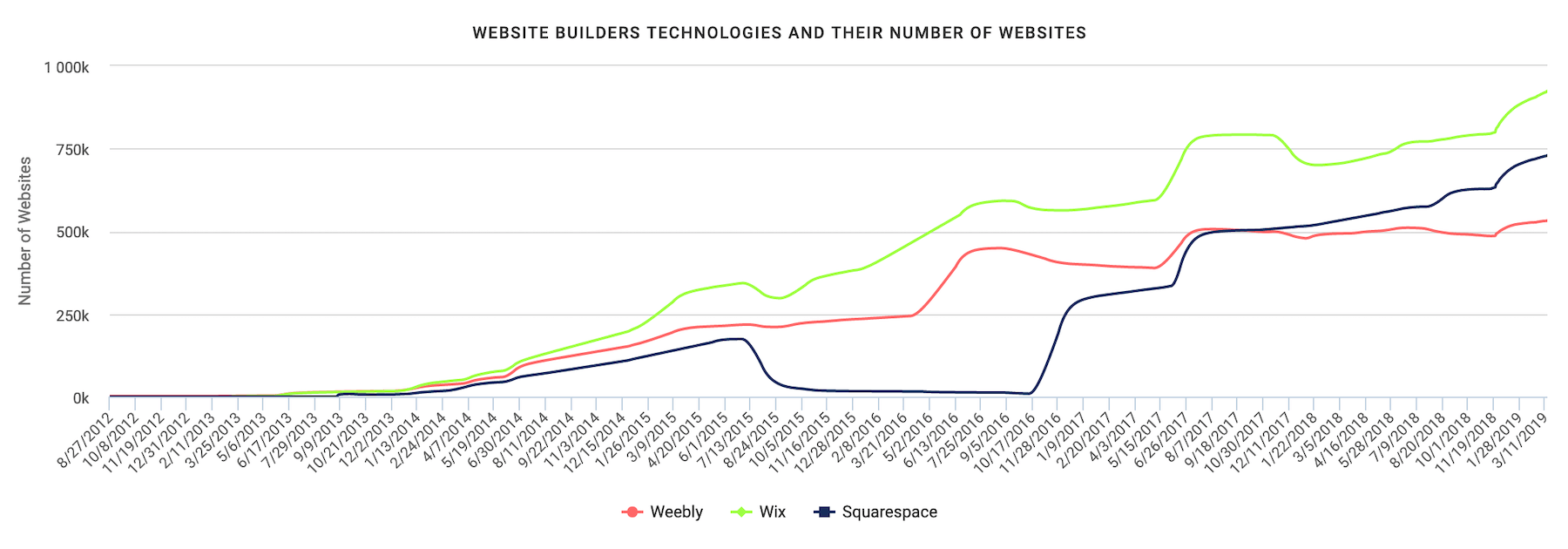Historically, web design has been a massive industry. Ever since the dawn of the web.
Once the dot-com era awoke, businesses of all sizes were realizing their need for a presence on the web.
Since then, the growth of the internet has ballooned. There’s not a chance that humans could ever revert back to living without the web now.
In many ways, the web has created amazing possibilities for people across the world.
But one of the growing challenges for both small business owners and web developers themselves is the increasing disconnect between the cost and process of building a killer website, and the speed and simplicity of do-it-yourself website builders.
What Killed Web Development?
One service we’re all familiar with is Wix. This online tool makes it incredibly easy for an individual who has no prior experience building websites to create and launch a site in a matter of hours. Less, even.
- Wix,
- Weebly, and
- Squarespace.
I call these “the big three”.
They are, today, the most popular DIY website builders in the United States. The three of them share a dominant market share, and have all increased in popularity and adoption over the course of the last few years. Here are some hard stats, courtesy of Datanyze:
 One of the most common concerns this causes for web developers is the uncertainty about what will become of the demand for design and development specialists.
One of the most common concerns this causes for web developers is the uncertainty about what will become of the demand for design and development specialists.
And the worry is certainly not unfounded. Clearly, the rise in popularity of these website builders in recent years is undeniable.
While it is definitely true that DIY website builders such as Wix, Weebly and Squarespace have risen in popularity over the recent years, it’s also the case that the demand for web designers has risen simultaneously.
More and more businesses today recognize that they require a strong web presence, as the internet is now the most used source of information and research for consumers before enlisting the services or products of any given business.
And it’s like that across the board.
Pretty much regardless of industry or vertical. From hairdressing to financial services and event meetups, the vast majority of consumers (of all ages) are now using the web as their number one source of information and research, and businesses who don’t appear within the top ten search engine results (SERP rankings) are in deep water.
 A large part of how well businesses rank in search engines is dependent on their website, and part of its quality lies in the value it gives to prospective customers.
A large part of how well businesses rank in search engines is dependent on their website, and part of its quality lies in the value it gives to prospective customers.
The popular view of seasoned professionals within the industry is that ‘web designers’ who create websites for customers using DIY website building tools like Wix and Squarespace are not designers, and therefore deserve to feel ashamed of the service they are offering and overcharging clients for.
This common viewpoint is substantiated by the fact that these ‘web designers’ are utilizing a consumer friendly drag-and-drop tool to create clients’ sites, without the need for any design or development skill.
The client could likely do as good a job themselves, in less than half the time that a questionable 'Wix web designer’ might propose.
It’s not the method of business that concerns professionals within the industry, but rather the fact that naive clients are simply receiving a ‘website’, not a brand machine.
Today, websites are the number one organic online marketing tool for businesses. Given that, a consumer’s website needs to convert, not just provide information.
There definitely is a rising barrier to entry for web designers and aspiring freelancers, because there is a growing number of small businesses and professionals who don’t yet recognize how stark the difference is between using a DIY website builder and employing the services of a web design/development professional.
However, if a prospective client cannot be convinced, it’s probably best to focus your efforts on clients who understand the need for a strong web presence.
After all, these clients are still in abundance and will be far easier to work with.
Ultimately, DIY website builders are limited in what they are capable of providing, and as a result, you can count it won’t be long before a small business owner realizes this for themselves.
For every website built with the top three DIY website builders as of 2019, there are approximately 1000 that aren’t (we did the calculations).
I don’t think there’s any need to worry.
Why Wix, Weebly and Squarespace are bad for small business owners
Why are website builders not worth your time?
Because you’re paying for failed marketing.
Your website is the single most important marketing avenue for your small businesses.
 And in using a DIY website builder, you’re severely bypassing the skills and expertise of digital branding and marketing professionals.
And in using a DIY website builder, you’re severely bypassing the skills and expertise of digital branding and marketing professionals.
You’ll slash your costs, which, it’s worth noting, is often a fixed cost when it comes to web development. This is particularly the case for smaller businesses.
But in my opinion, cost cutting here is simply not worth it. I genuinely don’t believe that cutting corners by seeking to reduce cost at the sacrifice of quality is beneficial for small businesses. Especially when your website is so vital to a business’ success.
Why small business owners choose DIY website builders like Wix
Perhaps the largest market for simple DIY website builders are individuals and small businesses.
Usually, very small businesses.
And I don’t mean startups—we’re talking small, local high street businesses.
For this demographic of clients, they may feel on that, on the surface level, DIY page builders like Wix are indeed all their business requires.
After all, if they’re a small, local establishment, what’s the need for a fancy, complex website?
I think this particular mentality is largely a culprit for why these businesses remain small.
Something we often forget is that small business owners and lay professionals don’t always recognize the importance of a highly tailored and well structured website—something Wix (and the like) simply can’t provide.
Local businesses (and as it happens, all businesses) grow online only from distinguishing themselves from the competition.
In the web space, one of the most effective ways to do this is to convert customers via a well designed and appropriately structured website.
Unfortunately, service providers such as Wix aren’t generally the optimal way to achieve this.
Why? Because when you’re using Wix, you don’t have the knowledge and skill of a User Interface specialist who understands how to convert traffic into customers.
 And that’s not all. You’re bypassing the expertise of other professional disciplines too:
And that’s not all. You’re bypassing the expertise of other professional disciplines too:
- Graphic designers
- Creative designers
- User experience specialists
- Front-end web developers
- Back-end web developers
- Search engine optimizers
- Branding experts
- Experienced digital marketers
Scary.
And that’s an important aspect of business in the 21st century.
Take the signage and storefront of a local business, for example.
Usually business owners will need to employ the help of a design and signage agency to produce a storefront design that will effectively pique the interest of passers-by.
I would hope that no business owner attempts to design their own logo, signage and storefront (it’s surprising how many try)! But with the dirt-cheap prices companies such as Wix and Squarespace offer for the immediate gratification of a hosted website and domain, business owners quickly lose sight of the importance of translating this design expertise to the web.
In fact, many will proceed to use services like Wix themselves, putting together a series of blocks on a page and rearranging them using drag-and-drop tools. It creates a website, but the website doesn’t convert, or even reach its target audience.
Still, it’s easy to see why it’s an attractive product for small business owners.
What website builders like Squarespace are good for
There are of course going to be a group of potential target market who find these tools useful and effective.
And for them they may even be completely sufficient.
But to be honest these are not usually the kind of clients who would need to be seeking a web developer's expertise. Web development is most often about branding and extending effective branding and brand awareness and marketing to the website, and thus only clients who are requiring this are really the target market.
 Unfortunately (or rather, fortunately for their competitors), many small businesses forego the expenses of quality (and most often, very necessary) branding through digital channels such as their website.
Unfortunately (or rather, fortunately for their competitors), many small businesses forego the expenses of quality (and most often, very necessary) branding through digital channels such as their website.
For the simple reason that a business’ online presence is so vital to their success on the web, small to medium businesses are definitely not candidates for website building tools like Squarespace and Wix.
That’s not to say that these products don’t hold value, for some.
One of the reasons that these companies have thrived so well in recent years is due in part to the fact that they serve a certain demographic of users fairly well.
I can say with confidence that anybody less than a small business could potentially be a candidate for a website built with a drag-and-drop site builder.
Individuals who are offering niche services on a very small scale, to people in their local area, perhaps, could find Squarespace a great tool for getting a website up and running.
But what makes these potential users candidates for using a website builder like Weebly?
Because their online presence isn’t important.
For some kinds of businesses, a strong online presence isn’t part of their business model.
For some people or small-scale transactional businesses, online branding and website accessibility simply isn’t important. For this type of small enterprise, branding is simply not important.
If the enterprise could operate successfully in the absence of the website, or if a website wouldn’t add value to the experience of their customers, Wix makes the perfect fit.
In fact, possible to host sites with most website builders void of cost, which usually requires that you use a branded subdomain of their service and promote the website builder on your site page.
For instance, your site may be required to feature a reference or advertisement at the bottom of its pages, and not be linked to a top-level domain name.
 These are reasonable demands for the website builder to make, given that you aren’t paying for the service they provide.
These are reasonable demands for the website builder to make, given that you aren’t paying for the service they provide.
One good example of a good use case might be for a church choir, who need a very simple website to provide upcoming dates for singing practice to the church’s choir members.
I mean, a Facebook Group would probably be better suited, but you know, everybody wants to run a website (who wouldn’t?).
Why are DIY website builders becoming so popular?
- Reason #1: Marketing is often deceptive
- Reason #2: Time in scarce for business owners

- Reason #3: Money is scarce today. Prices for competing services, hosting etc are rising
- Reason #4: Increasing saturation in the web design and development industry leaves businesses overwhelmed, not knowing where to look or who to choose ((PLUG EXISTING BLOG POST about how to hire a web developer)
- Reason #5: These tools have become better with time, but they’re still not great
How services like Wix affect web developers
There is obviously a huge concern amongst web developers that website building tools like Wix could potentially detract from careers in the industry due to an increase in uptake.
Previous services, such as infamous AI website builder The Grid, have historically caused a shake up in the webdev community due to concerns about conventional web development declining.
As legitimate a concern this may be, it simply isn’t the case. The pricing of these drag-and-drop page building tools fuel unrealistic expectations in clients.
They see such attractive price plans and assume that the expertise of website and branding professionals can be set aside.
I mean, one popular free website builder even states on their own website that using their service means you have “No developer to pay”. Shocking.
This can, in many cases, end badly. I’ve seen it before. The small business owner decides to drag-and-drop the website themselves, compromising the integrity of consumer perception and brand message.
Unfortunately for web developers, it means they now have to compete against a whole new market.
The free website builder. The drag-and-drop solution.
It means that developers are forced to change their marketing strategies, which is nevertheless a tall order, adding significantly to their business efforts.
The irony is, worrying about the problem is quite unnecessary. Because website builders have nothing on web developers.
There’s an easy way to compete with anyone who promotes products and services in your industry niche: offer something they don’t.
Common Question: But is the problem really getting worse?
Answer: Yeah, for now. It’s not that it’s getting worse but more that we can see there is a definitive growth in the usage of popular do it yourself website building platforms.
What happens if Wix, Weebly & Squarespace continue to grow?
There’s no knowing for sure. One thing that’s for certain is that the popularity of these tools is definitely increasing, and don’t show any signs of slowing down.
For now.
In fact, the explosive growth of these platforms is, in a way, a case of history repeating itself. Allow me to tell you a story, it’s quite interesting actually. And hugely relevant, too.
Some fifteen or so years ago, I actually held a position involved in the management of both free and paying customers for a Silicon Valley based tech startup, who at the time, offered similar services to Wix, Squarespace and the like.
Back then, in the early 2000s, the market for these kind of do-it-yourself website building tools was absolutely enormous.
 The online discussion boards that the company operated were turning over such a volume of new messages and support requests from customers, that it was challenging for the customer service team to even keep up.
The online discussion boards that the company operated were turning over such a volume of new messages and support requests from customers, that it was challenging for the customer service team to even keep up.
At one point, we were forced to develop an initiative within the company to start taking on volunteer support staff, from across the world, in spite of the fact we probably didn’t know too much about them personally (we tried).
I’ll be honest - as crazy as it sounds, the strategy worked at the time.
Suddenly, things became a lot more manageable for the internal team.
Having a team of volunteer support personnel was great! Users received responses and advice around the clock, as the volunteers continued to work once the light went out at 6PM in the Silicon Valley offices.
Having said that, the company was rather stingy with internal staffing, dedicating less than five members of staff to manage the online discussion boards.
Anyway, moving on to my point.
The sheer number of personal users and small businesses taking advantage of the website builder that the company had developed was astonishing. I vividly remember the celebration we held when the service reached 50 million customers worldwide. It was crazy.
Unfortunately, the company neglected to change with the times, and competitors like Wix and Weebly soon claimed their space in the DIY website building space.
Funny thing was, it wasn’t solely down to a lack of updates and improvements to the website builder that led to (in my opinion) its downfall. Rather, I began to notice an interesting move from competitors.
Wix and Weebly, who were — at the time — perceived as providing less value to customers than our website builder, seemingly began to invest in their marketing strategies. Big time.
It was like a bomb had gone off. I was seeing advertisements for these services everywhere, and I’ll be honest, it shook the very ground I walked on.
Why? Well, mostly because we were once viewed by small businesses as the free website builder of choice, offering far more integrated services and addons for websites than Wix and Weebly combined!
 I think that these companies definitely succeeded in the redevelopment of their brands. I mean, clearly. They reclaimed their space, and it only grew from there. Unfortunately, the company I worked for just didn’t see this coming. And to be frank, they weren’t so phased by the movement of the competition anyway.
I think that these companies definitely succeeded in the redevelopment of their brands. I mean, clearly. They reclaimed their space, and it only grew from there. Unfortunately, the company I worked for just didn’t see this coming. And to be frank, they weren’t so phased by the movement of the competition anyway.
We were still ‘THE PLACE’ to build your own website quickly.
And of course, when I say quickly, I really mean quickly. Under a day. If you already have your content ready, probably in under two hours.
But anyway, back to the story.
Eventually, staff began to feel the impact of the financial strain the company was under. Of course, it took several years before the strategic moves of the competition began to catch up with us. By this point, employees slowly began handing in resignations to chase their career dreams in innovative tech elsewhere. Shame.
I’d soon leave too, for the same reason (and yes, I’m very glad I did).
Today, the company is merely a shell of what it once was. It seems in pretty bad shape. But it’s not surprising, really. marketing is powerful.
It wasn’t long after the likes of Wix and Weebly that an additional, similar-but-different service made its way onto the scene. And this time, it promised to be offering something different. Squarespace launched, and its marketing was great.
It was aggressive, and I distinctly remember just how intrusive I found it.
I mean, the marketing was great. I think most, including myself, were very impressed by what the service claimed to be offering. Squarespace was like Wix, but on steroids. And the pre-packaged templates available were worlds away from the awful designs Wix (and co) were providing.
Many sole traders and small businesses began to build and host their websites with Squarespace. In fact, Squarespace remains a very popular choice for this demographic today. Personally, I see it as a better alternative to services like Weebly’s website builder. It’s a little more professional.
I now realize that I’ve sidetracked a little... let’s return to my point.
Ultimately, the takeaway of this story is that the increasing flux of small businesses opting to use do-it-yourself solutions like Squarespace and Wix seems to simply be a case of history repeating itself.
As I said, I remember the epic work party we had when the company I worked for hit 50 million customers.
Personally, I think it’s more so down to a massive improvement in strategy and marketing for these website builders, which has led to an increased level of success, as of late.
Many small business owners have grown tired of the CMS era, which saw WordPress, Joomla and Drupal rise to fame.
As much as these technologies are still very much on the rise, small business owners now have the attractive alternative of building their websites themselves. I’m with you in that I agree that it’s a misinformed decision to make, but you can’t help but understand why.
I think it’s certainly a possibility that over time, we’ll see a decrease in the popularity of DIY website builders again.
 I reckon that history will, yet again, repeat itself. It’s bound to. As online markets become more saturated, services such as Wix and Squarespace will be forced to increase their service offerings, and unfortunately, DIY solutions can only provide so much. In terms of flexibility, scalability, and function, these self-serving solutions are simply unable to compete with the likes of powerful alternatives.
I reckon that history will, yet again, repeat itself. It’s bound to. As online markets become more saturated, services such as Wix and Squarespace will be forced to increase their service offerings, and unfortunately, DIY solutions can only provide so much. In terms of flexibility, scalability, and function, these self-serving solutions are simply unable to compete with the likes of powerful alternatives.
WordPress, the world’s most popular content management system, continues to grow every single day. And that, with assurance, I can say isn’t going to change any time soon.
The web development industry is saturated
We all know it. Everybody does. The web design industry is saturated. And the same goes for web development, in nearly every area.
With the growing number of freelancers and the increasing market share that digital design agencies hold, it’s becoming harder for web designers and developers to differentiate themselves and compete.
And as if competing in your city or state wasn’t tough enough, a huge number of clients are now seeking the services of agencies and professionals from across the globe.
Web development professionals are now competing in a deep sea of international competition. As web development has one of the smallest overheads, and with the recent boost in web-related education on offer all over the world, things are about to get tough.
DIY website builders and drag-and-drop solutions are allowing business owners greater opportunity to skimp on digital branding, and this now poses an additional challenge to web designers and developers alike.
While tech-wise small business owners do exist, many are also sadly not.
It’s now more important than ever to differentiate yourself against the competition.
 There’s an old adage that goes "you can lead a horse to water, but you can’t force it to drink".
There’s an old adage that goes "you can lead a horse to water, but you can’t force it to drink".
Instead of focusing your efforts on attempting to convince prospective clients of the drawbacks of using website builders like Wix, instead direct your attention to working with clients who already understand that they don’t want to use Wix.
You’re likely to find far more success this way. And save yourself the headaches.
Web Developers Will Always Be Needed
It’s understandable that web developers will be concerned about the recent rise in popularity of cheap (or free) DIY website builders.
However, with my past experiences, I don’t believe there’s a reason to be worried. And here’s why:
Ultimately, there will always be a place for web designers and developers.
You may be aware of a project called The Grid, which made headlines some years ago with claims to reinvent the way websites are built, offering web design by artificial intelligence. The service, by now, was founded nearly ten years ago. It still hasn’t publicly launched, in spite of huge amounts of money in backing. This backing, in part, was down to a large influx of users registering for ‘Founding Membership’, which guaranteed them a lifetime of voided or reduced costs for using The Grid to build and host their websites.
Today, there are all sorts of horrifying reports regarding the apparent disappearance and abandonment of the project. I remember, in fact, when it was the only advertisement that would play before any (unrelated) YouTube video I was trying to watch, and just how impressive the services’ marketing was.
Now, I understand that there are plentiful reasons for project abandonment and business failure, but The Grid is the second website building tool I’ve mentioned in this blog post that hasn’t faired so well in the long term.
Here are some links I found by users of The Grid's the community:
- Everything is down
- IS thegrid.io DEAD? Have prosecutors been notified?
- Anyone else having trouble making updates to their pages?
- Class Action Lawsuit
- The Grid? Crickets.
- Lifetime membership is about to expire, no answer from support. WTF
- is theGrid dead?
In fact, here's an interesting video I also stumbled upon:
Some things are just too good to be true. And while artificial intelligence is indeed incredibly powerful, I don’t believe that it can ever replace the need for decisive branding conclusions to be made by humans.
After all, as a species, we are essentially humans marketing to humans. And nobody knows us better than ourselves.
 That’s why I think it’s of utmost importance to leave business-critical decision making to professionals.
That’s why I think it’s of utmost importance to leave business-critical decision making to professionals.
Professionals at business-critical decision making. And today, the effectiveness that online presence has for a business involves a chain of highly business-critical decisions.
Conclusion
The increase in popularity of free do-it-yourself website builders does not impact the number of legitimate businesses who require the services and expertise of web designers and developers.
The solutions that website builders provide can only ever go so far, and will unfortunately never be able to replace the intricate logic and strategy that the human brain is capable of.
Not even if they were powered by artificial intelligence in the future. Web development is an art, and so far, that is something that artificial intelligence isn’t quite capable to replace.
As long as the internet exists, there will be an undying need for web designers and developers.
What do you think about website builders? Do they have a place in web design and development? Let us know in the comments down below.
